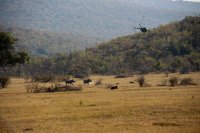‘We didn’t know each other before we came. Independently of each other, we approached Frank van Langevelde of Resource Ecology in Wageningen because we were interested in his anti-poaching project. He wanted to use data collected from herbivores with a transmitter to track down poachers in Africa, thus contributing to the conservation of the rhino and the elephant. We emailed him, and a few months later we were bashing through the African bush in a Land Rover, looking for zebras, impalas, wildebeest and eland.’
GPS coordinates
The idea is that we use the behaviour of other herbivores, so not the rhino or the elephant itself, to detect the presence of poachers. To do that we first have to relate behaviour to the data we get from the transmitters. In the safari car we go in search of animals with transmitters. The transmitters give the GPS coordinates and measure speed along three axes. We then note what the animal is doing. Running, drinking or grazing, for instance. My project focuses on linking the coordinates and speed data with behaviour. Christine looks at the behaviour of animals introduced into the area for the project. She is focusing on the question of how quickly these animals adapt.

Baby leopards
In our spare time we goon safari in the Land Rover as often as we can, to enjoy the nature in the game park. It is different and exciting every time. We’ve been followed by elephants a few times. The young males, especially, don’t like it if you get too close and they try and chase you away. Then you have to put the car in reverse and get out fast. In the first month we saw all the big five: elephant, buffalo, rhino, leopard and lion. We even saw baby leopards. That was a fantastic experience. Normally these animals are extremely shy.
We are doing the research in an area of 1200 hectares. We sleep in safari tents and as well as us, there are two South African students doing internships. We are quite isolated: it is 23 kilometres to the nearest village of any size and three hours’ drive to the city. So you can’t just get on a bike and go somewhere. There is only a bit of electric fencing between us and the game. The first night we could hear antelopes fighting just outside the fence. We had no idea what it was. It was a bit scary.’
